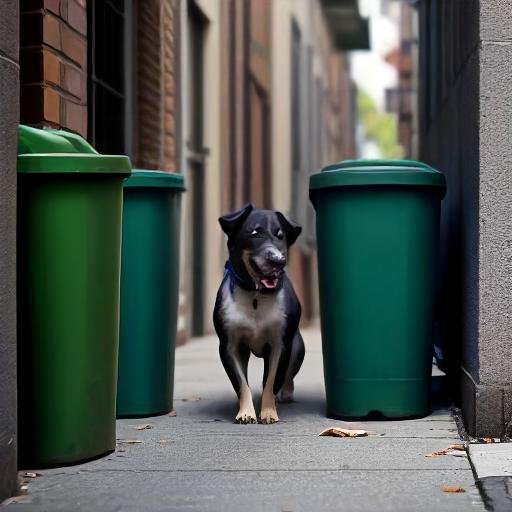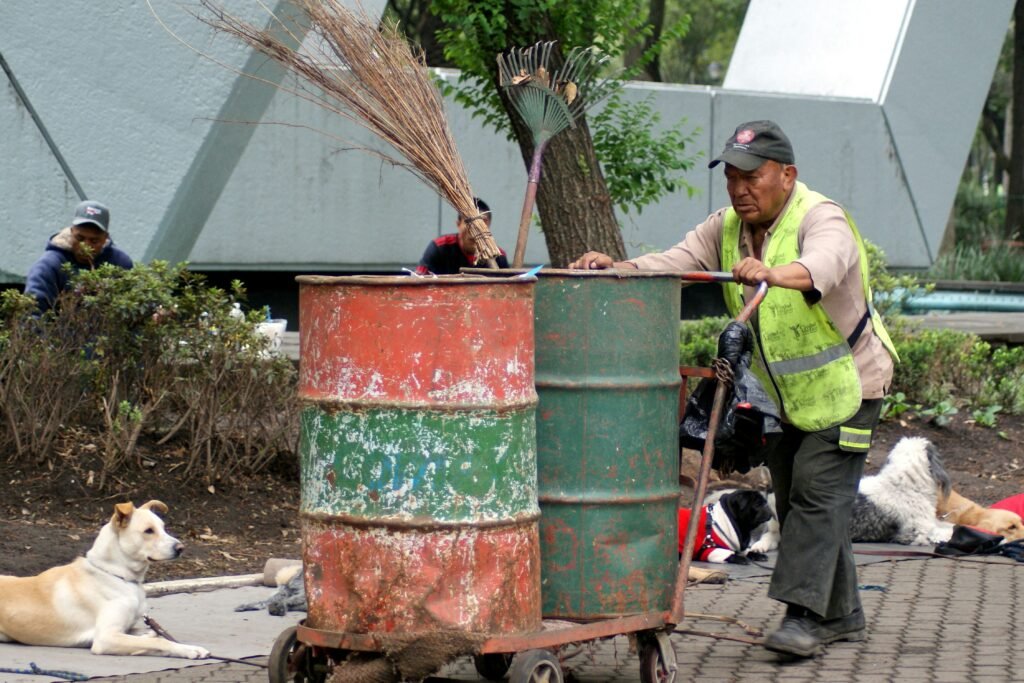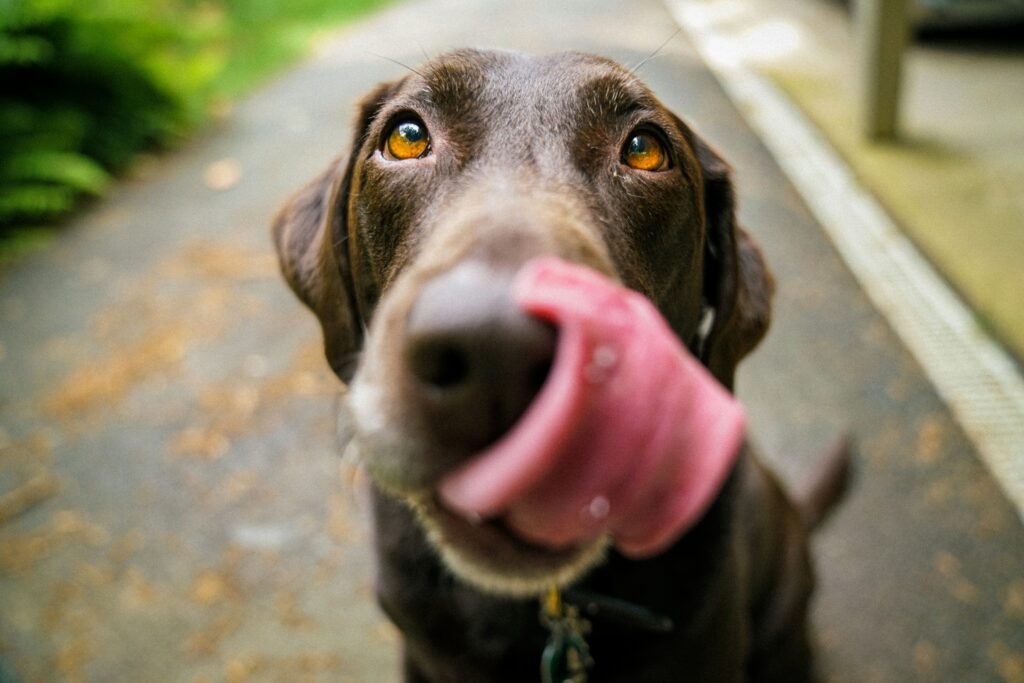If you’ve ever walked outside on trash day only to find your garbage strewn across the lawn, either you have a serious enemy, or your neighbor’s dog got into the trash cans again.
If it’s the former, we can’t help you much with that.
While various animals might be responsible for the mess, dogs are common culprits. In this article, we’ll explore what attracts dogs to garbage cans, how to identify if a dog is the one causing the problem, and the issues that can arise from their scavenging behavior.
Is it a dog or another animal?
Dogs are attracted to garbage cans primarily because of the smell of food waste. Their keen sense of smell can detect even the faintest scent of discarded meals, drawing them to investigate. Dogs have natural scavenging instincts that compel them to search for food sources, even if they are well-fed at home.
To determine if a neighbor’s dog is getting into your garbage, look for specific clues. Scattered trash around the can, torn garbage bags, and paw prints in the area are telltale signs. Dogs often leave behind shredded packaging or half-eaten food items. In contrast, smaller animals like raccoons or opossums tend to leave neater openings in bags and may target specific food items.

Birds, such as crows or gulls, typically scatter lighter debris and leave droppings near the scene. If the garbage is tipped over and the can itself is damaged, a larger animal like a dog (or maybe a bear, depending on where you live) might be responsible. Keep an eye out for pet waste nearby, as this can also indicate a dog’s presence. If you’re uncertain, setting up a motion-activated camera can help you identify the culprit.
A dog getting into your garbage can lead to various problems. Consuming spoiled food or harmful items like cooked bones or plastic packaging can pose serious health risks to the dog. The scattered trash can also attract other pests and animals to your property, creating a larger mess and potential health hazards. Plus, you know, you have garbage strewn all over your lawn.
Why Some Dogs Scavenge More Than Others
Some dogs have a stronger urge to scavenge than others. From an evolutionary standpoint, dogs are descendants of wolves, who are natural scavengers. This instinct to search for food is deeply ingrained in some dogs, even if they aren’t going hungry at home. If a dog is bored or not provided with enough mental and physical stimulation, they might also seek out garbage as a source of entertainment or exploration.
Breeds Prone to Scavenging
While any dog can develop a habit of getting into garbage, some breeds are more prone to this behavior than others. Breeds with strong scavenging instincts include:
- Beagles
- Labrador Retrievers
- Basset Hounds
- Bloodhounds
- German Shepherds
These breeds have a keen sense of smell and were often bred for hunting or tracking purposes, which can contribute to their desire to scavenge. But a dog’s individual personality and training play a significant role in their behavior, regardless of breed.

Training a Dog to Stay Away from Garbage
If your neighbor’s dog is causing the issue, you might first suggest training the dog to stay away from garbage cans. While positive reinforcement and redirection via toys or other activities can help, it’s possible the dog simply needs to understand that trash cans are off limits. Repetition and consistency are key — if the dog is caught near the garbage cans, the neighbor should reprimand the dog until it understands the message. Unless you know the dog well, do not attempt to do this yourself, as some dogs can become aggressive.
Providing alternative activities or toys can also help redirect the dog’s scavenging behavior. Keep them engaged with puzzle toys filled with treats, or offer them plenty of chew toys to satisfy their natural urge to chew and explore. Regular exercise and mental stimulation can also help reduce a dog’s desire to seek out trouble. Seek out local dog trainers in the area who can help offer tips.
How to Dog-Proof Your Garbage Cans
You can prevent a neighbor’s dog from getting into your garbage in one of two ways: by making your trash cans less accessible or less appealing. Depending on the dog’s determination, either (or both) approaches might be necessary.
However, keep in mind that whatever solution you employ shouldn’t make it too difficult for the garbage haulers to empty your bins on trash day — so finding a balancing act is key. Here are a few ideas:
- Use secure lids with easy-to-open latches, particularly garbage cans with tight-fitting lids that have a latch or clip system. Look for cans with latches that are easy for humans to open but difficult for dogs to manipulate, such as lids with a simple locking mechanism, heavy rubber or metal lids, or lids with a tight seal. This will allow garbage haulers to easily empty your cans on trash day while keeping dogs and other animals at bay.
- Place cans in a fenced area with a gate. Keep your garbage cans inside a fenced area, such as a side yard, and secure the gate with a latch that garbage haulers can easily open on trash day. Check with your garbage company to make sure this is allowed.
- Use a bungee cord or strap. On days when it’s not trash day, secure your garbage can lid with a bungee cord or strap. This will prevent dogs from opening the lid while allowing you to easily remove the cord on trash day for the garbage haulers.

Scents and Safe Repellents
While it might seem like a good idea to look for garbage cans that seal to minimize odors that might attract dogs, it won’t work. Dogs have an acute sense of smell, so regardless of how good you seal the lid, a dog’s nose will still know what’s inside. However, you can employ deterrents to make your garbage less attractive to curious canines.
- Citrus or hot pepper sprays: Spray a solution of these ingredients around your garbage cans, focusing on the lid and handles. Reapply the scent after rain or on trash day.
- Motion-activated alarms or sprinklers: If you’re desperate, you could try installing a device that emits a loud noise — or even better, a noise only audible to dogs — when triggered by motion near your garbage cans, or place your cans near motion-activated sprinklers to startle dogs or animals that might investigate. Make sure you turn off the alarms or sprinklers on trash day, though! A soaked garbage hauler probably won’t be too happy if you don’t.
When it’s not trash day, keep your garbage cans in a secured area such as a garage, shed or locked storage area to prevent dogs, bears or other animals from having access to them.
Talking to the Neighbor
If you’ve caught the neighbor’s dog red-handed or have reason to suspect the next-door dog as the culprit, it’s essential to address the issue with your neighbor calmly and cordially to prevent future incidents and maintain a friendly neighborly relationship.
Approaching the situation with a calm, solution-oriented mindset can help you resolve the problem.
How to Bring Up the Issue
When approaching your neighbor about their dog’s behavior, consider the following tips:
- Choose a calm, non-confrontational approach: Start the conversation on a friendly note, expressing your concern for both your property and the dog’s well-being.
- Offer evidence of the dog’s behavior: If tactful, provide photos or video footage of the dog getting into your garbage. This can help your neighbor understand the extent of the problem and take it more seriously. However, your neighbor will likely take your word for it, so don’t start the conversation by shoving a phone or video in your neighbor’s face.
- Suggest solutions or compromises: Come prepared with ideas for preventing the dog from getting into your garbage, such as training methods, resources or alternative garbage can storage solutions. Be open to your neighbor’s suggestions as well.

Should I leave a note?
Depending on your relationship with your neighbor, leaving a note about the issue might cause more harm than good. If you have a close, friendly relationship but can’t seem to catch your neighbor at a good time, a note might work, but a face-to-face conversation is almost always better.
Whether intended or not, a note might come across as impersonal or passive-aggressive, and it doesn’t allow for immediate dialogue or problem-solving. An in-person conversation allows for a more personal, friendly approach and enables you to gauge your neighbor’s reaction and work together to find a solution.
Ultimately, the best approach will depend on your specific situation and relationship with your neighbor. If you have a friendly rapport, an in-person conversation may be the most effective way to resolve the issue. However, if you anticipate a negative response or have had difficulty communicating with your neighbor in the past, a carefully worded note may be a better choice.
Conclusion
Dealing with a neighbor’s dog getting into your garbage can be frustrating, but with strategic prevention methods and clear communication with your neighbor, you can minimize the issue. Don’t let a dog outsmart you.
If it’s your enemies throwing trash all over your yard, on the other hand — well, we suggest seeking professional help and advice.

